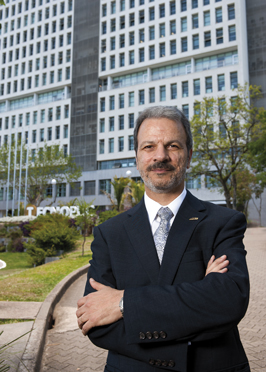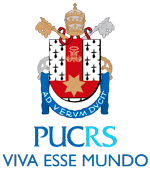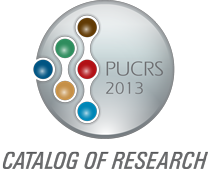Foreword
Research Structures
Energy, Environment, and Biodiversity
- Metallic Materials Engineering
- Solar Energy
- Biodiversity and Ecosystems in Fields and Forests of the Atlantic Forest
- Economic, Human, and Environmental Development
- Primatology
- Genetics, Evolution, Ecology, and Conservation of Carnivores
- Oleochemistry: Processes and Products
- Technologies to Mitigate Environmental Impacts
- Ichthyology
- Ornithology
- The Center for Wind Energy
Humanities and Ethics
- Fundamental Rights
- Theological and Ethical Anthropology
- The Political Authoritarianism and Press in Contemporary Brazil
- Christology within the Contemporary Latin American Context
- Law and Bioethics
- Clinical Bioethics
- Ecclesiology and Emergent Problems
- Analytic Epistemology
- Ethics, Contemporaneity, and Deconstruction: The Philosophical Criticism of Violence
- Immigration, Towns, and Foreigners Narratives of Brazil (1864–1964)
- Criminal Procedure and Democratic Rule of Law
Culture and Education
- Southern Writers Collection
- Architecture and Heritage
- Culture, Subjectivity, and Formative Policies
- Between the Memories and Stories of Schools at Rio Grande do Sul: From the Deutscher Hilfsverein to Farroupilha School (1858-2008)
- Enunciation and Discourse
- Education for Health and Inclusive Education
- Teaching of Physics
- Format Y: Formation in Mathematics for Generation Y
- History of Literature: The Investigation and Diffusion of Sources
- Reading Literature: The School and Other Social Agencies
- Chemical Education
- Relationship between the Nature of Science and Science Education
- Literature, History, and Theories on the Imaginary
- Training of Professors, Licentiates, and Pedagogical Practices
Society and Development
- Companies and Organizations
- Law and Economy
- Study and Research on Violence
- Family, Social Work, and Health
- Architecture and Industrialization
- Agribusiness
- Social Well-being Economics
- Applied Mathematics
- Class Action Lawsuits
- Psychology and Social Policies: Memory, History, and Production of the Present Time
- Inter-organizational Relationships and Systemic Competitiveness
- Parties, Elections, and Political Communication
- Fundamental Principles of Tax Law
- Social Demands and Policies
Information and Communication Technology
- Wireless, Wired, and Optic Communications
- Organizational Communication
- Strategy and Innovation
- Hardware Project Support
- Computing Molecular Biophysics – The Modeling and Simulation of Biosystems
- Technological Development in Telehealth
- Resource Management and Virtualization
- GThe Management and Governance of Information Technology
- International News at the Global Village
- Communication Science
- Ubiquity and Technological Convergences in Communication
- Aerospace Research
- The Performance Evaluation Group
- The Group on Systems, Signals, and Computing
Biology and Health
- Cancer and Other Pathologies of the Oral and Maxillofacial Region
- Memory
- Molecular and Functional Biology
- Cardiometabolic Risk, Aging, and Nutrition
- Health Education and Work
- Structural Biochemistry
- Pediatric Respirology
- Applied Pharmacology: Characterization of Mechanisms Involved in Pain, Inflammation and Cancer
- Immunology and Immunodiagnostics
- Nephrology
- Neurosciences
- Orthodontics
- The Promotion of Health in Longevity
- Olympic Studies and Health Sciences
- Nerve Regeneration
- Intensive Neonatal Medicine and Congenital Infections
- Aerospace Pharmacy
- Medical Imaging
- Pulmonology
- Orofacial Pain and Temporomandibular Disorders
- Metabolic Transformations of Purines of Biological Importance
- The Study of Parasitosis, Biochemical Parameters, and Hematological Parameters Associated with Aging
- Aerospace Science
- Bioethics and Ethics Applied to Animals
- Pharmacovigilance
- Evaluation and Intervention in the Life Cycle
- Surgery for Obesity and Metabolic Syndrome
- Modification of Lifestyle and Cardiovascular Risk
- Nanostructures and Nanoscopy
- Clinical and Experimental Neuropsychology
- Psychology of Occupational Health
- Memory and Neurodegeneration
- Epidemiology, Neurology, and Immunology
- Chemistry of Natural Products
- Health Economics
Research Structures and Researchers
- RESEARCH STRUCTURES AND RESEARCHERS
- Business School: Management, Accounting and Economics (FACE)
- School of Architecture and Urbanism (FAU)
- School of Biosciences (FABIO)
- School of Aeronautical Sciences (FACA)
- School of Social Communication (FAMECOS)
- Law School (FADIR)
- School of Education (FACED)
- School of Physical Education and Sport Science (FEFID)
- School of Nursing, Nutrition and Physiotherapy (FAENFI)
- School of Engineering (FENG)
- School of Pharmacy (FFARM)
- School of Philosophy and Human Sciences (FFCH)
- School of Physics (FAFIS)
- School of Computer Science (FACIN)
- School of Letters: Languages, Linguistics and Literature (FALE)
- School of Mathematics (FAMAT)
- School of Medicine (FAMED)
- School of Dentistry (FO)
- School of Psychology (FAPSI)
- School of Chemistry (FAQUI)
- School of Social Work (FSS)
- School of Theology (FATEO)
- Institute of Bioethics (IB)
- Institute of Geriatrics and Gerontology (IGG)
- Institute of Research and Development (IDÉIA)
- Institute of Biomedical Research (IPB)
- Institute of Toxicology and Pharmacology (INTOX)
- Institute of the Brain (InsCer)
- Institute of Environment and Natural Resources (IMA)
- Museum of Sciences and Technology (MCT)
Research as a differential of quality
Jorge Audy - Vice-President for Research, Innovation, and Development
 PUCRS is known for the quality of its
actions and for its pursuit of academic
excellence. In the areas of research,
innovation, and graduate studies, this
excellence is directly reflected in several
positive evaluations by the scientific
community, particularly by major
government funding agencies, such as
CAPES (MEC), CNPq, and FINEP (MCTI).
PUCRS is known for the quality of its
actions and for its pursuit of academic
excellence. In the areas of research,
innovation, and graduate studies, this
excellence is directly reflected in several
positive evaluations by the scientific
community, particularly by major
government funding agencies, such as
CAPES (MEC), CNPq, and FINEP (MCTI).
Research in PUCRS is driven by its 24 graduate programs, involving 24 master’s and 21 doctoral degree programs, as well as approximately 360 faculty members. The research is carried out by 313 research groups that have been certified by CNPq, 21 research centers, 94 laboratories, 54 nuclei, and 7 research institutes. Institutional mechanisms have been developed to support two major fronts: (1) strengthening the role of the Office of Research Ethics, which coordinates the work of the Ethics Committee (CEP), the Ethics Committee on Animal Use (CEUA), and the Ethics Committee on Scientific and Technological Development (CEDECIT); and (2) expanding the INOVAPUC Network, which coordinates projects and mechanisms in the area of innovation and entrepreneurship, involving the Science and Technology Park (TECNOPUC), the Agency for Technology Management (AGT), the Technology Incubator, the IDEA Institute, the Support Center for Innovation Management (NAGI), the Entrepreneur Center (NE), the Center for Innovation (CI), the Office of Technology Transfer (ETT ), and the Enterprise Management Agency (AGE).
The Office of Research, Innovation, and Development (PROPESQ) guides its action according to the University Strategic Planning in relation to the areas of research, innovation, and development, focusing on the principles of quality and relevance and contributing to excellence in undergraduate and graduate education, as well as developing the scientific, cultural, social, and economic spheres of our society. Given the national and international impact of higher education, the challenges in this arena involve issues related to (1) Internationalization, (2) Innovation, and (3) Interdisciplinarity. These challenges are addressed in the context of actions guided by (1) a strong Interaction with sectors of the University and with society, (2) understanding the Uncertainty that is present in the environment as stemming from the knowledge-based society and the historical moment in which we live, and (3) engaging in actions based on the constant search for Integrity in research, innovation, and the development of actions. The PROPESQ turns its attention to identifying the opportunities that these challenges present in this context. Although the challenges currently facing a community university, such as PUCRS, are considerable, we are confident that the institution is prepared to meet and overcome these challenges while continuing its active participation in society, which is an essential element for the advancement of present and future generations.
Acting in alignment with the PUCRS strategic planning, as well as with the mission, vision, and reference framework of our University, PROPESQ presents the third edition of this catalog of research as a representative overview of our research. Several prominent research structures were organized around six major intersecting themes that guide interdisciplinary approaches to study and solve the complex problems of our society.
I hope that this document will provide readers with a comprehensive overview of the areas of research, innovation, and development of PUCRS resulting from the work and dedication of many of our University members under the responsibility of the Directorate of Research and with the support of the Division of Projects.




